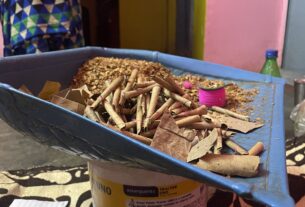The community has the OBC status in Karnataka, but more than 10 states have given them SC status.
When India was still under colonial rule, Siddojirao was a livestock trader in the place we know as Karnataka today. He wanted to educate his only daughter so that she could find a good place in society.
More than 10 decades later, today his grandchild, Anup Kumar, staged a demonstration to protest against the exclusion of the Khatik community from the Scheduled Caste (SC) and Schedule Tribe (ST) Act.
At 10:30, there were 200 people protesting in Freedom Park. A couple of hours later, it was raining and the crowd had swelled to 2500. They weredemanding reservations under SC/ ST quota from the current Other Backward Classes (OBC) status they have.
The protestors had travelled to Bangalore from all over the state. Around 30 percent of them were women.
R.K. Siddaramanna, also a member of the community, said the microscopic community that majorly consists of butchers are slowly lagging behind due to an absence of reservations. “In more than 10 states across India, including Maharashtra, West Bengal, and Uttar Pradesh, we have got SC reservations, however, we have been fighting for it in Karnataka for more than 30 years,” he added.
As a result, the community is slowly drifting away from development, he added.
Low education rates, women empowerment
Siddaramanna said less than 15 per cent of people manage to get a degree beyond high school. And less than two per cent have jobs outside butchering.
“Less than five per cent of the women from our community are empowered. A lack of awareness and education are confining them to their homes,” Sharath Fasalkar, another member of the community said.
Siddaramanna said, from the beginning not a single person from the community has been a public representative at the parliamentary or judicial level.
“We desperately need reservations that can help us get pursue further education, get public representation and get a job—reservations that SC quota can provide us with,” Siddaramanna added.
The stigma:
Anup Kumar, 30, is one of the first generations in the community to go to college. Today he is a double graduate, and is also pursuing law. “Even today, when people come to our home, people often refuse to drink the water I serve,” he said.
The Khatik community, also known as Katukaras (a person who has a cruel heart) continue to be stigmatized, especially the women. “Many of us are often scared of the exposure to society and prefer to follow the family tradition of butchering,” Anup added.
In 2012, the community initiated an Ethnographic Report, funded by the government under the Statistics department. The report recommended that community was eligible for SC/ST reservations.
“We have submitted the report to Backward Class Commission, however, there have been no updates till now,” Siddaramanna said. “Today we demand the state cabinet to recommend the community to Delhi and help us find a place in the society.”
The silver lining
Across states where the Khatik community has SC/ST reservations, the education, job, and empowerment aspects improve drastically, a community member from Uttar Pradesh said.
Dr. Bizay Sonkar Shashti, a Khatik community member and also a Member of Parliament said, “The inclusion of the community into SC/ST community requires two major parameters, state recommendation and unclean occupation.” Though we already fulfil the second clause, a lack of involvement from the state cabinet is delaying the process, he added.
He said, in Uttar Pradesh (UP) and Haryana more than 70 per cent of members of the community have their high school education completed. In Rajasthan the percentage shoots upto 80 percent. At least 60 percent of women from the community have completed their high schools owing to the SC/ST reservations, he added.
He said in places where the community has SC reservations the number of public representations from the community rise up to 30 per cent.
“I have worked as a cabinet minister under Atal Bihari Vajpayee, and have also served as a chairman of National Commission of SC/ST,” Bizay added.
Inside UP at least five members have representations in the current parliament, he claimed. In Maharashtra, people from the community like Kripal Tumane are already members of the parliament. And others like, Shivajirao Kamble and Jagannath Pahadia have been former chief ministers of Indian states, he added.
“The state government is not serious enough today. Reservations are crucial to push a marginalized community to find their own identities,” he added.
For Siddaramanna, Supreme Court is the only option if their voices fail to reach the state government. “It is our democratic right and we will fight for it,” he said.




